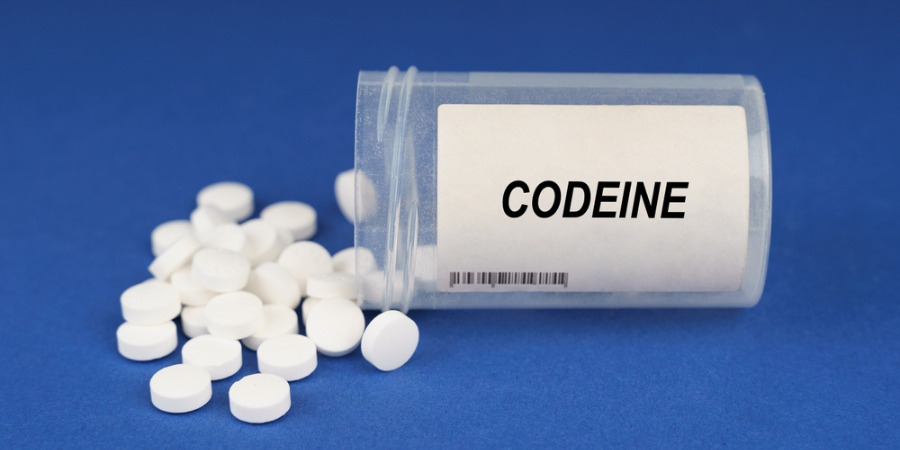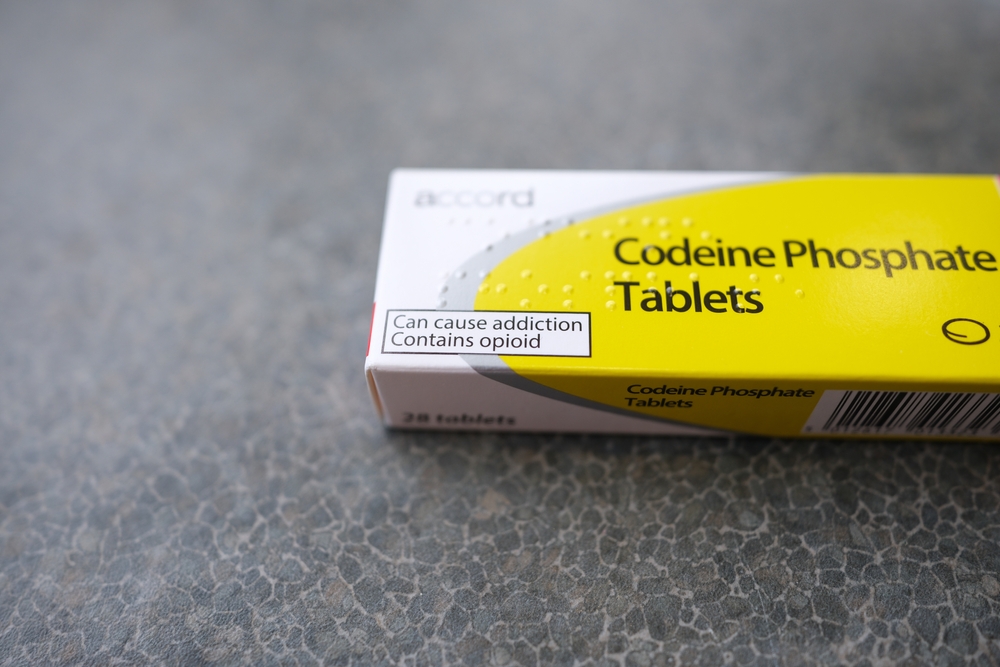Last Updated:
July 21st, 2025
Codeine Addiction | Symptoms, Effects and Causes
Codeine is a common painkiller in the UK that is used for everything from mild aches to breaking up coughs. However, despite its effectiveness, there is a growing concern about the misuse of codeine. As with many prescription medicines, codeine addiction develops stealthily and many people don’t realise they are becoming addicted until it’s too late. The consequences of codeine addiction are serious and spotting the signs of codeine addiction early can even prevent a fatal accident. To help you understand the risks of misusing codeine, this page will cover codeine addiction symptoms, risk factors and its potential consequences.

Codeine explained
Codeine is an opioid medicine used to relieve pain, quiet coughs, and, in certain cases, stop diarrhoea. It is often mixed with other medicines like paracetamol (you might know this as acetaminophen) or anti-inflammatory drugs such as aspirin or ibuprofen.
Most of the time, codeine comes in the form of pills or syrup that you swallow, but it can also be found in suppositories and sometimes given by injection at a hospital. While codeine in its pure form or in high-strength versions is only available with a doctor’s prescription, some lower-strength products may be available over the counter.
In most cases, codeine is strictly regulated in the UK due to its potential for abuse. It is classified as a class-B controlled drug, but if it’s prepared for injection, it becomes a class-A drug, which means the legal consequences are even more severe. If someone is caught with codeine without a prescription or if they’re selling it illegally, they could face serious penalties, including prison time.
How does codeine work?
Codeine works by affecting the brain and body in a specific way. It targets the µ (mu) codeine receptor, which is part of how our bodies manage pain and mood. Codeine itself doesn’t directly bind to this receptor but instead, changes into morphine in the liver, which is much stronger and acts on these receptors more effectively.
Once morphine is in your system, it dulls pain by reducing how excited neurons in your central nervous system get. This happens because codeine slows down the release of certain neurotransmitters like dopamine and GABA. These chemicals help control the brain’s reward and pleasure centres and control the fear and anxiety experienced when neurons are overexcited.
This reduction in neurotransmitter activity not only makes you feel less pain but also more relaxed and happy. It is these pleasurable side-effects of codeine which make it both effective and prone to abuse.
What is codeine addiction?
Codeine addiction means that a person continues to use it despite knowing it’s harming them and often while wanting to quit. This can start in different ways including using codeine to get high, to try and dampen symptoms of mental illness or after being prescribed codeine for a medical issue.
Starting to use codeine for pain or relaxation can quickly escalate. Initially, it provides relief or pleasure, but soon, the body demands more to achieve the same effects due to tolerance. This progression often leads to dependence, where individuals feel compelled to take codeine regularly to function normally.
The problem starts when the body demands more codeine due to building tolerance. This means codeine no longer relieves pain or gets you as high as it did before without you upping your dose. Soon, this can turn into a physical dependency, causing you to feel sick or out of sorts if you try to quit suddenly (codeine withdrawal).
On top of this, you can also become emotionally dependent on codeine, relying on it for everything from day-to-day stress to soothing deeper emotional pain. When codeine has both a physical and psychological hold over you, it is time to get professional help for codeine addiction.
Spotting the signs of codeine addiction
Because codeine is so common, spotting the signs of codeine addiction is not as easy as it may be with other drugs. People often try to hide codeine addiction symptoms, too, so it is important to understand some of the most subtle indications. Here are some telltale signs of codeine addiction which can often go unnoticed:
- Realising you’re not taking codeine for pain anymore but because you enjoy or need it.
- Spending all your money, time and energy just getting more codeine because you crave it so badly.
- Putting off responsibilities to use codeine.
- Your friends and family are becoming increasingly worried about you.
- Lying to loved ones about codeine so that they don’t worry.
- Buying codeine illegally, lying to your doctor to get more or stealing it from other people.
- Being unable to stop even if you want to or you can see that codeine is hurting you.
These codeine addiction signs and symptoms can be scary, but spotting them early is a great chance to seek professional help for codeine addiction.
What causes codeine addiction?
As explained above, codeine releases chemicals into your brain that make you feel good, and this alone is enough to make codeine use into a habit. However, codeine addiction doesn’t necessarily follow for everyone. That is because a mixture of personal factors and situations creates the psychological reliance that keeps you using despite the harm. These include:
- Family history and a genetic predisposition to addiction
- How your brain reacts to codeine and how quickly its functions change
- Using codeine as a way to treat or live with mental health problems
- The environment you were raised in and where you live now
- How easy it is for you to get codeine
- Your personality trait
- The levels of stress you live with day-to-day
All of this needs to be taken into account both when codeine is prescribed and when forming an effective codeine addiction treatment programme.
What are the mental and physical dangers of codeine addiction?
Codeine addiction and abuse are incredibly dangerous, both to your physical and mental health. Some of the most concerning dangers include:
- Risk of codeine overdose: Taking too much codeine can be extremely dangerous. It can slow down your breathing or stop it altogether, which can cause brain damage and can even be fatal.
- Mental health damage: If you are already dealing with feelings of anxiety or depression, codeine addiction can actually make these feelings stronger. It can also spark new mental health conditions that didn’t affect you before and cause confusion and mood swings.
- Constipation: Codeine can cause serious constipation, which can be uncomfortable but can also do extensive damage to your digestive system. You may also experience chronic abdominal pain and find it hard to keep food down.
- Liver damage: Your liver helps clean your blood but if there is too much codeine for the liver to process, it can cause immense liver damage. The risk of serious liver damage is increased if codeine is mixed with paracetamol, as it is commonly found in over-the-counter combinations.

How to overcome codeine addiction
Overcoming codeine addiction begins with a crucial phase known as detoxification, or detox for short. In this stage, healthcare providers guide you through safely reducing your dependence on codeine, closely monitoring your well-being and helping ease the symptoms associated with codeine withdrawal.
After successfully navigating opioid detox, the pathway to recovery continues with rehabilitation, commonly referred to as rehab. Codeine rehab services are accessible via the NHS and various private facilities, each offering different treatment approaches. Inpatient programmes are the most beneficial as they provide an immersive environment alongside various therapies and a robust aftercare plan.
How to get help
If you or someone you know is grappling with codeine addiction, don’t hesitate to reach out for support. Codeine addiction is absolutely treatable with the right help, so get in touch with us, and we can guide you towards the best treatment options.
Our compassionate team are ready and available to take your call, and guide you towards lasting the lasting addiction recovery you deserve.
Frequently Asked Questions
(Click here to see works cited)
- UK-Rehab. “Codeine Addiction & Abuse | UK Rehab.” UK-Rehab, https://www.uk-rehab.com/opiate-addiction/codeine/. Accessed 13 January 2025.
- UK Addiction Treatment Centres. “Codeine Addiction: Codeine Abuse Signs & Symptoms | UKAT.” UK Addiction Treatment Centres, 5 December 2023, https://www.ukat.co.uk/addiction/drug/prescription/opiate/codeine/. Accessed 13 January 2025.
- Carter, Alan, and Zawn Villines. “Codeine withdrawal: Symptoms, timeline, causes, and treatments.” Medical News Today, 9 May 2022, https://www.medicalnewstoday.com/articles/326849#causes. Accessed 13 January 2025.
- NHS. “Codeine: medicine to treat pain and diarrhoea.” NHS, https://www.nhs.uk/medicines/codeine/. Accessed 13 January 2025.

